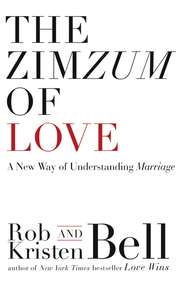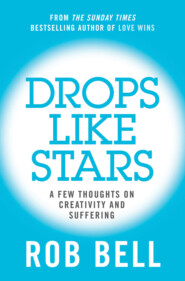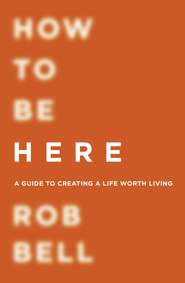По всем вопросам обращайтесь на: info@litportal.ru
(©) 2003-2024.
✖
The Complete Rob Bell: His Seven Bestselling Books, All in One Place
Автор
Год написания книги
2018
Настройки чтения
Размер шрифта
Высота строк
Поля
And Jesus is there with his disciples. As good Jewish boys, they never would have gone to this place before. It is twenty-six miles from Galilee, where Jesus and his disciples are from. What was that walk like? Did Jesus even tell his disciples where they were going? Can you imagine them talking to each other behind his back? “When our parents find out about this, we are so busted!” The whole experience would have been riveting. Where are we going? What are we doing? What is our rabbi going to do next?
He tells them at Caesarea Philippi that upon this rock he is going to build his new witnessing community, and the Gates of Hell won’t be able to stop it. He is essentially saying that those kinds of people—the ones with the goats—are going to join the Jesus movement and it will be unstoppable. How would you as a disciple even begin to process this statement?
Rabbis were passionate and funny and quirky and unpredictable. They told stories and laughed and went to a lot of parties and never stopped asking questions and pushing their students and keeping them guessing. Rabbis devoted their energies to their students to help them learn to do what they did, and they used every opportunity they had to prepare their students.
“I Chose You”
At one point, Jesus’s disciples are riding in a boat and Jesus comes walking by on the water. And one of the disciples says, “If it’s you, let me come to you on the water.”
It’s a weird story, isn’t it?
And it gets even weirder when the disciple Peter jumps out of the boat because he wants to walk on water like Jesus.
But it makes sense—maybe not the water part, but the disciple part.
If you are a disciple, you have committed your entire life to being like your rabbi. If you see your rabbi walk on water, what do you immediately want to do? Walk on water.
So this disciple gets out on the water and he starts to sink, so he yells, “Jesus save me!”
And Jesus says, “You of little faith, why did you doubt?”
Who does Peter lose faith in?
Not Jesus; Jesus is doing fine.
Peter loses faith in himself.
Peter loses faith that he can do what his rabbi is doing.
If the rabbi calls you to be his disciple, then he believes you can actually be like him. As we read the stories of Jesus’s life with his talmidim, his disciples, what do we find frustrates him to no end? When his disciples lose faith in themselves.
He even says to them at one point, “You did not choose me, but I chose you.”9 (#ulink_735963e3-6ae9-5b06-858c-2a533e139619)
The entire rabbinical system was based on the rabbi having faith in his disciples.
Let’s spend some time here, because the implications of this truth are astounding. A rabbi would only pick a disciple who he thought could actually do what he was doing. Notice how many places in the accounts of Jesus’s life he gets frustrated with his disciples.10 (#ulink_7fe6fd62-3887-59f3-9320-fca5df8e2288) Because they are incapable? No, because of how capable they are. He sees what they could be and could do, and when they fall short, it provokes him to no end. It isn’t their failure that’s the problem; it’s their greatness. They don’t realize what they are capable of.
So at the end of his time with his disciples, Jesus has some final words for them. He tells them to go to the ends of the earth and make more disciples.11 (#ulink_3a21809b-7bdf-5fea-adb5-9a47467b1632) And then he leaves. He promises to send his Spirit to guide them and give them power, but Jesus himself leaves the future of the movement in their hands. And he doesn’t stick around to make sure they don’t screw it up. He’s gone. He trusts that they can actually do it.
God has an incredibly high view of people. God believes that people are capable of amazing things.
I have been told that I need to believe in Jesus. Which is a good thing. But what I am learning is that Jesus believes in me.
I have been told that I need to have faith in God. Which is a good thing. But what I am learning is that God has faith in me.
The rabbi thinks we can be like him.
MOVEMENT SIX New (#ulink_d2458739-edf9-526a-b5dd-0e96329ce6b2)
I was having lunch with a guy who was telling me about a struggle he had been having for a while. He said he knew he was a sinner and that he was fallen and that he would keep committing this one sin, and he knew he was going to keep committing this one sin because he was a sinner and his nature was evil and there was nothing he could do about it because of what a sinner he was . . .
Do I have to go on?
I was so depressed I wanted to bang my head on the table. His question was basically, why do I struggle like this?
And all that was running through my head during his questions was that his system was perfectly designed to achieve the results he was getting.
He’s convinced he is a sinner, he’s convinced he is going to sin, he has no hope against sin, he believes his basic nature is sin, and then he wonders why he keeps sinning.
And what was so startling to me is that he said he had just become a Christian.
It seemed to me that becoming a Christian had given him all sorts of new things to feel guilty about. I wondered if becoming a Christian had made his life not better but actually worse.
And then a little while later I had a similar experience. I was listening to a pastor speak, and his point was that people weren’t reading their Bibles enough and weren’t praying enough and weren’t being spiritual enough. If people would just do more—read their Bibles more and pray more and be more spiritual—basically just more “mores,” then God would be happy with them.
I felt terrible. What was the point of even trying?
It’s not that praying and reading the Bible are bad; it’s just that I wanted to do them less and less the more and more he talked.
It wasn’t so much what he was saying as it was the place he was coming from. The beginning premise seemed that we are bad and don’t do enough, and if we are made to feel guilty enough about it, then we will change our behavior.
I don’t think this is what Jesus had in mind.
His greatest anger was reserved for religious leaders who weighed people down with guilt and shame. He says to a group of Bible scholars and teachers, “You experts in the law, woe to you, because you load people down with burdens they can hardly carry, and you yourselves will not lift one finger to help them.”1 (#ulink_6089b830-e5a6-5649-bcb7-a44770ea8256)
A little while later he calls them “sons of hell.”
He goes on to say that it is possible for religious leaders to actually get in the way of people entering into the life of God.2 (#ulink_fe9504ec-7451-5bee-b015-dc10627ac300)
So what is the message? How should people feel about themselves?
Have you ever heard a Christian say, “I’m just a sinner”? I can’t find one place in the teachings of Jesus, or the Bible for that matter, where we are to identity ourselves first and foremost as sinners. Now this doesn’t mean that we don’t sin; that’s obvious. In the book of James it’s written like this: “We all stumble in many ways.”3 (#ulink_15620d43-bc04-5083-a5f1-b68533ff0037) Once again, the greatest truth of the story of Adam and Eve isn’t that it happened, but that it happens. We all make choices to live outside of how God created us to live. We have all come up short.4 (#ulink_4e754d99-89a8-52f6-8699-8f5cd35f6dd8)
Who We Are Now
The first Christians insisted that when we become Christians, a profound change occurs in our fundamental identity. In who we are at the core of our being. In who we are first and foremost, before we are anything else. In our awareness of ourselves. The first Christians were convinced that in identifying with Jesus’s death on the cross, something within us dies. They called this person who died the “old man” or the “old woman.” The person we were before we had a spiritual birth.5 (#ulink_a65041d0-7e15-5a26-8de3-3ce0a14d7a9a)
Now this idea of death and rebirth is not a new idea—it has been around in almost every religious tradition since people first started talking about these things. But the first Christians believed that this idea had been lived out in a new and unique way in Jesus’s death and resurrection. Paul put it like this in the book of Colossians: “For you died, and your life is now hidden with Christ in God.”6 (#ulink_47dceda3-2f60-5102-95b2-233568872871)
So this old nature of mine—the one that was constantly pulling me down and causing me to live in ways I wasn’t created to live—has died. And no matter how many times that old nature raises its ugly head and pretends to be alive, it is dead.
And not only did that old person die, but I have been given a new nature.
Again, Paul writes in Colossians, “You have been raised with Christ.”7 (#ulink_0dca2977-4d73-5a4a-8bd6-65129800d5dc) I have this new life, this new identity that has been given to me. I have taken on the identity of Christ.
Paul continues, “You used to walk in these ways, in the life you once lived.” These first Christians kept insisting that something so transformational was happening in the lives of followers of Jesus that they could refer to their old lives as “the life [we] once lived.”8 (#ulink_68be8fb6-1f18-521a-8f3c-3dada92c52be)
It is not that we are perfect now or that we will never have to struggle. Or that the old person won’t come back from time to time. It’s that this new way of life involves a constant, conscious decision to keeping dying to the old so that we can live in the new. Paul describes it as Christ being our lives.











